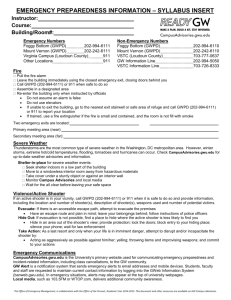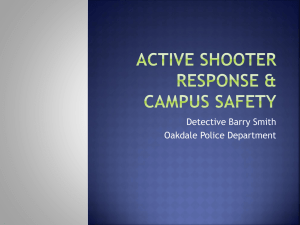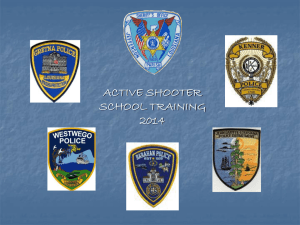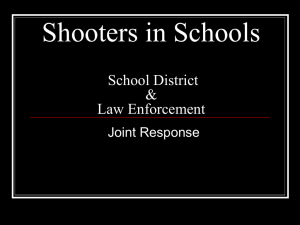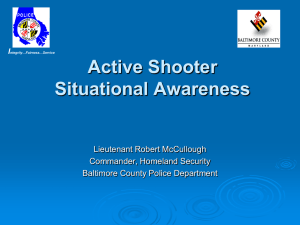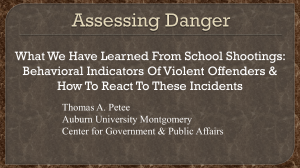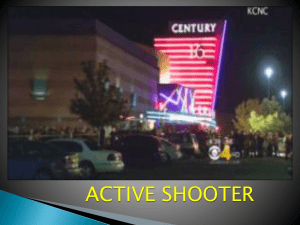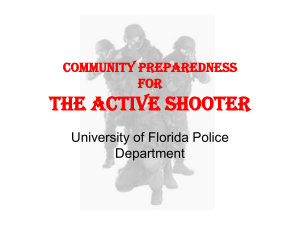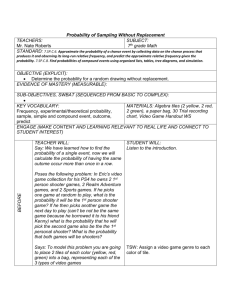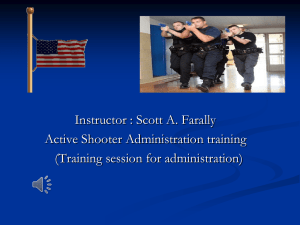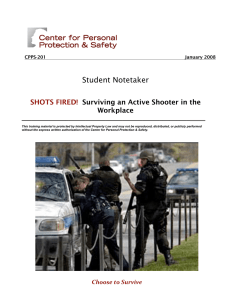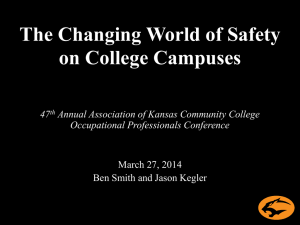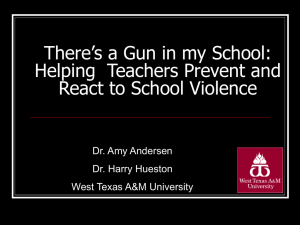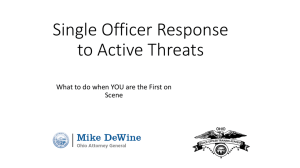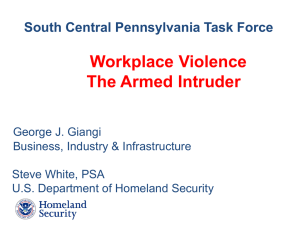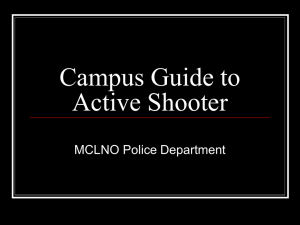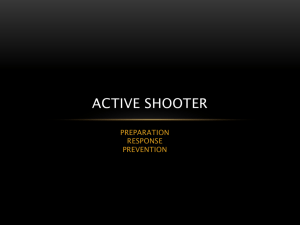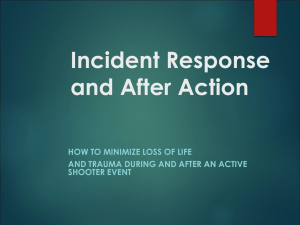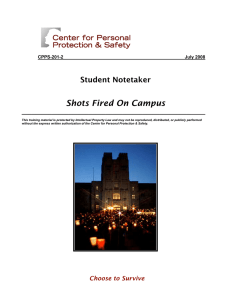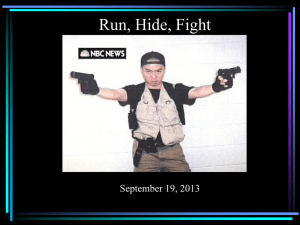WRHEPC Armed Aggressor Training
advertisement
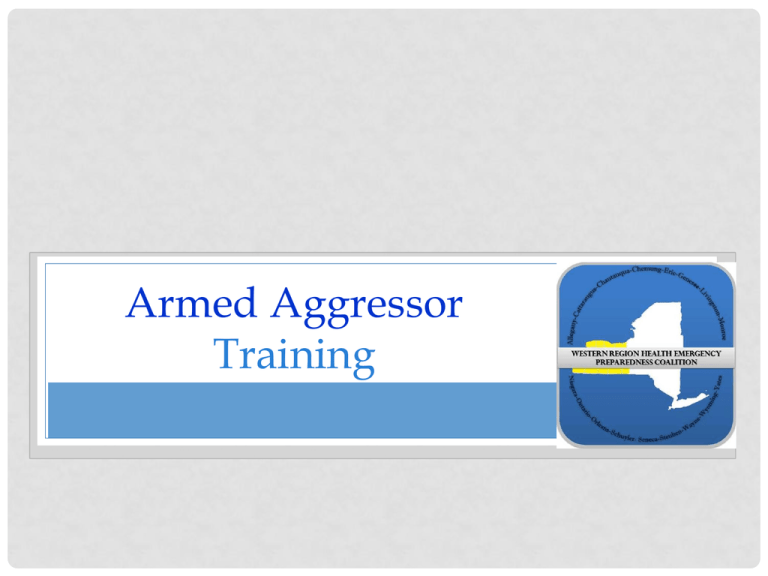
Armed Aggressor Training RUN. HIDE. FIGHT. SURVIVING AN ACTIVE SHOOTER EVENT In Memory and Honor of What is an Active Shooter? An active shooter is an individual aggressively engaged in killing or attempting to kill in a confined and populated area. The situation occurs rapidly and without warning. The shooter’s objective may be a specific target such as an estranged spouse or former boss or may just be all persons present. In either case anyone within weapon range is a probable victim. Most end in less than 15 minutes so the arrival of Law Enforcement may have little effect on the outcome. The shooter often commits suicide or is looking for “suicide by cop.” Individuals need to prepare physically and mentally to respond to an active shooter incident Some Known Active Shooters Eric Harris & Dylan Kiebold Columbine High School James Holmes Aurora, CO Seung-Hui Cho Virginia Tech Dr Amy Bishop University of Alabama Adam Lanza Newtown, CT Jared Lee Loughner Tucson, AZ Local Active Shooters Frank Garcia Lakeside Hospital and Canandaigua William Spengler Webster NY Some Disturbing Statistics… (Source: New York City Police Department) • 98% of active shooting incidents are committed by a single attacker • 96% of active shooters are male • In 78% of active shooting incidents there is a connection between the shooter and at least one of the victims (family, academic, professional) • 29% of incidents occur in a school setting, another 55% occur in commercial settings such as an office. • 40% of incidents end with the shooter committing suicide with another 46% being terminated through applied force (Law Enforcement, Security, Others). Preparation Don’t assume it will never happen to you! • Be aware of your surrounding at all times along with any possible dangers • Blocked Exits • Broken Locks • Unlighted Areas • Know your exact workplace address • Street address, suite number, etc. • Have an escape plan, same as in a fire. • Look for at least two exits for any facility you visit or work in. • Work as a team to pre-plan for these types of incidents. For instance, what is a safe location to assemble once you escape? Indicators of Potential Workplace Violence by Employees, Clients, & Others • Increased drug or alcohol use • Increased unexplained absenteeism • Suicidal comments; Desire “to put things in order” • Decreased attention to appearance & hygiene • Paranoid type behavior. “Everyone is against me” • Depression/Withdrawal • Increased talk of problems at home • Resistance/overreaction to policy changes • Domestic problems escalating into the workplace. • Repeated policy violations • Severe financial problems • Increased severe mood swings • Talk of past incidents of violence • Unstable emotional responses. • Empathy with individuals who commit violent acts. • Explosive unprovoked outbursts • Increased interest in firearms and other weapons. Response to an Active Shooter Run! Hide! Fight! Run! • Use your escape plan! Get out at the first sign of danger. • Leave belongings behind • Take others with you if possible. • You may need to leave wounded behind. • You cannot help others if you become a victim yourself. • Try to prevent others from entering • Keep your hands visible • Follow orders of Law Enforcement • Call 911 when safe to do so. • Keep in mind in a crowded location that others may be doing the same. Hide! • Find a place to hide where shooter is less likely to find you. • Plan this out ahead of time in your workplace. • If possible determine a place that will not trap you. • Stay out of the shooter’s view • Lock the door, barricade with heavy furniture if possible. • Hide behind heavy objects (desks, file cabinets, etc.) • Remain quiet. Silence your cell phone ringer and other sources of noise. • Dial 911 if possible. • If you cannot talk just leave the line open • ***You cannot text 911!! (Probably)** Fight! • As a last resort to save your life you may need to attack the shooter • Act as aggressively as possible! • An attack by a group is more effective than by a single person (Remember United Flight 93) • Improvise weapons (chair, laptop, paperweights, sharp objects) • Throw things • Yell and shout, try to disorient the shooter • Commit to your actions! If You Reach 911 Before Law Enforcement Arrives • Provide the following information, if known: • Exact address of incident location (Critical) • Number of shooters, descriptions, their location • Number and type of weapons seen • Number and location of potential victims. When Law Enforcement Arrives…. • They will probably enter in teams. • May be in standard uniform or SWAT style attire • May be armed with rifles and shotguns • They won’t usually know what the shooter looks like. • Be prepared for them to be shouting orders and pushing people to the ground. • Keep your hands empty and in plain sight • Follow their orders to the letter. Save your questions for later. • Understand that rescue of the wounded will not occur until the scene is secured. • Expect to be taken to a safe location and held there for identification and debriefing Follow-up by Management and Others • At assembly point/ safe location perform an accountability check of all employees to determine anyone is missing and potentially injured. Inform Law Enforcement of any person unaccounted for. • Determine a means for those who are safe to notify their families. • Address notification to families of casualties. Coordinate this with Law Enforcement. • Provide for physical and psychological care for all involved (including yourself!). Lockdown • A Lockdown is a process to secure an area from a threat. It can include containing an incident in it’s area of origin through the movement of people • If a Lockdown is announced all exterior doors are secured and checkpoints are established at vehicle entrances. Law Enforcement may be called to assist. Movement of those inside is restricted and visitors are prevented from entering. Allowing employees with proper photo ID to enter is situational based and will be determined by the Incident Commander. • Your Actions: • • • • Cease normal operations Clear all hallways Secure doors Shelter in Place until directed otherwise by those in authority or All Clear is announced. Your goal is to return home in the same condition you arrived in! Acknowledgment Training Program Developed by: John A. Cassin, MPA, CEM, ENP Emergency Planning Specialist Unity Health System Jerrold Seldes, CHSO Director, Corporate Security and Emergency Preparedness Unity Health System Run, Hide, Fight Video (available on YouTube) Courtesy of the City of Houston, Texas http://www.readyhoustontx.gov/ Share with Family and Friends It is Important! For Further Information • Insert appropriate contact information for your facility here
